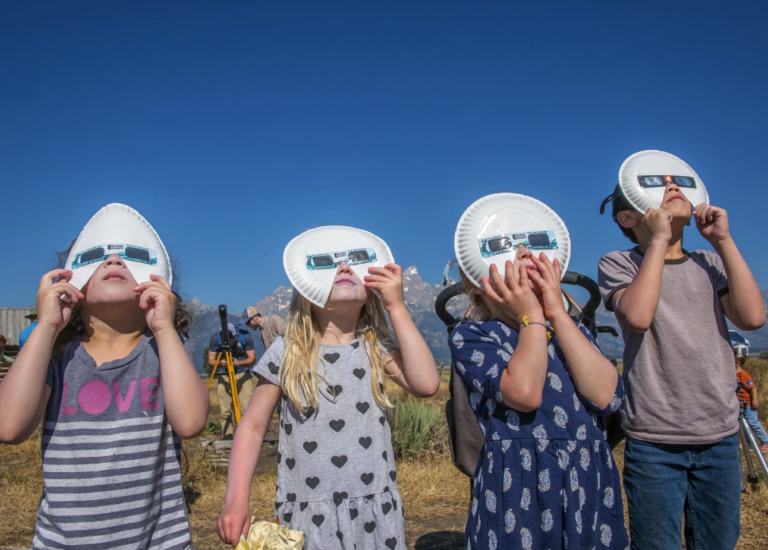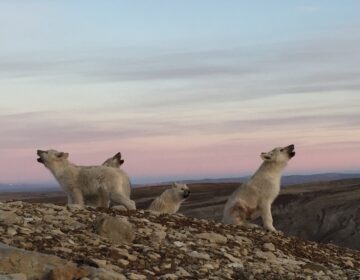A lot of kids got to see the last total eclipse. What they remember may surprise you

A group of children don eclipse glasses to watch the 2017 solar eclipse at Grand Tetons National Park in Wyoming. (VW Pics/Universal Images Group via Getty Images)
What you need to know
- Here’s what you need to know about the total solar eclipse
- Drexel researchers will send a balloon into the stratosphere to measure ozone
- University of Delaware students will be part of a NASA experiment
- Not in the path of totality? You can still watch Monday’s total solar eclipse online
- Watching a solar eclipse without the right filters can cause eye damage. Here’s why
- Simple tips to safely photograph the solar eclipse with your cellphone
- Here’s what time the eclipse will be visible in your region
- And if you’re looking to safely photograph the eclipse, here are some simple tips
People who chase total solar eclipses all around the world will tell you that seeing the moon blot out the sun, plunging the world into sudden darkness, can be a transformative, unforgettable experience.
That’s why fourth grade teacher and STEM coach Lisa Buckner at Linden Elementary School in Oak Ridge, Tennessee was surprised when she recently reached out to some former students who’d actually seen one. They’d attended a big event she organized to observe the total solar eclipse that swept across the United States in 2017.
“They’re like, ‘Yeah, I don’t really remember it,'” says Buckner, laughing. “I was like, ‘Really?'”
“I thought they would remember it for a lifetime,” she adds.
After all, eclipse experts like Ralph Chou stress how overwhelming a total eclipse can be.
“Particularly for young people, a solar eclipse can be a life-changing event, literally,” says Chou, a vision scientist with the University of Waterloo in Canada who saw his first total solar eclipse at age 12. If all goes as planned on April 8th, when another total solar eclipse will cut northeast across the country, he’ll get to see his 20th.
Rick Fienberg, who is the project manager for the American Astronomical Society’s eclipse task force, says that he and his colleagues have encountered plenty of people who were profoundly affected by seeing the 2017 eclipse.
“We’ve heard them tell us their stories over a cup of coffee,” says Fienberg. “And many of them have said, ‘Yeah, it changed my life. It has turned me into an eclipse chaser,’ or ‘It’s caused me to read endless astronomy books or to pay more attention to science news.'”
But that’s just anecdotal, he says. He’s not aware of any data showing whether or not an eclipse can, say, boost the number of young people going into science careers — much less any studies attempting to quantify the ineffable emotional impact of seeing the sun blacked out.
As for Buckner’s students, it was the little details that stuck out in their memories — like biting moon pies into the shape of partial eclipse phases, or getting to look through some big telescopes set up by an astronomy club.
“What I thought was so amazing,” says Buckner, “is not really what they talked about remembering.”
From light to dark
One of the students who attended Buckner’s eclipse-observing event is Kaylee Tress, who is now an 8th-grader at Robertsville Middle School in Oak Ridge.
“I remember mostly everybody went crazy when it got dark,” says Tress. “It was such a bizarre feeling.”
She doesn’t think it had any lasting effects on her life — at least not that she’s aware of now.
“But it was definitely a really cool experience,” she says. “It’s hard to explain with words.”
Some kids in Tennessee who were younger than she was in 2017 don’t have any clear memories.
“I think we went to the front yard to watch the sun,” says Lilly Coffman of Oak Ridge, who is now 9 years old, and saw the last eclipse at home with her grandmother. “I don’t remember.”
Evelyn Sherfy, who is also now 9 years old, had to check with her older sister. “Weren’t we, like, with the neighbors?” she asked, uncertain. Her sister confirmed that yes, they’d gone to a blueberry farm with some neighbors.
Kids who were a few years older at the time seem to remember more.
Kepler Colwell was five years old when he saw the 2017 eclipse outside his family’s home in Knoxville, Tennessee. He says it’s not a “super-clear memory, but a pretty decent, clear memory. I remember it pretty well.”
Specifically, he remembers looking at his family’s white car when the last bits of the sun got covered up by the moon.
“Like, the car was there — it just went from light to dark, instantly,” he says. “Everything was dark. It was really cool.”
Ella Hay, who was six years old when the eclipse happened, remembers being out in an open field with her best friend, teacher, and all of her classmates.
“I have a mental picture of what it was,” she says. “It slowly got dark and then, BAM.”
The sounds of insects
Landon Davis was five years old when the eclipse happened, and remembers being on the playground and using eclipse glasses before the big event. “I don’t really remember that much,” he says.
His brother Jayden, who is a few years older, also remembers wearing eclipse glasses. “But I also remember hearing crickets, like at its peak of darkness I heard crickets as well,” he says.
The nighttime insects starting to make noise during the day also made an impact on Odelia Kneiser, who was in the fifth grade in 2017.
“That’s definitely the most distinct memory I have from that day,” she says.
She has no memory of seeing the totally eclipsed sun as a black circle in the sky, but does remember wearing a welding helmet that her father had fitted out with the proper filters to safely view the partially eclipsed sun.
And while she enjoyed seeing the eclipse, “I think it’s not as significant as I’ve heard other people express it as.”
Jayden Davis also said it doesn’t rank all that high in terms of his most important memories. “Here and there, I think about it sometimes,” he says.
Chase Stanek, who is now a junior in high school in Wisconsin, says that even though the event was super-memorable and fun, “I wouldn’t say it changed my life path or any of that.”
A ‘wake-up call’
Some of the young people who saw the eclipse say it had more of an impact.
“I don’t know about lasting effects — but it’s definitely right up there as a top memory because, you know, it’s not a common event,” says Alex Shulze, who was nine years old when he saw the eclipse. “It was something really un-normal. It was fun. It was very different. It’s not something that I’d ever, obviously, seen. So I was really happy to actually experience it and kind of see what happened.”
He’s become interested in meteorology — before the eclipse, he’d already been paying attention to the dynamic power of storms — and says it’s possible that the eclipse, with its effects on temperature and the environment, might have influenced that growing fascination.
George Breiwa is now a high school senior in Lodi, Wisconsin, and he remembers almost everything about his fifth grade trip to see the eclipse — which he described as “a wake up call.”
“It’s not something you see every day, obviously. So it just kind of brought the perspective of like there’s more out there than you see every day, every year, you know?” says Breiwa. “It just kind of broadened the horizons and perspectives on literally everything.”
The teacher who organized the eclipse field trip for Breiwa and his classmates, Alison Juntunen, says that maybe young people are more likely to be influenced by an eclipse than older people.
“They have more time maybe to dream and ponder and be changed,” she says. “I feel like that is a possibility.”
And any effects could be subtle. Laura Peticolas, for example, was nine years old when her family went to see a total solar eclipse in Oregon in 1979. She vividly remembers driving out in the family’s VW bus and camping, with her dad playing Pink Floyd’s Dark Side of the Moon.
What she doesn’t remember is the sun becoming a black void in the sky.
“I don’t remember it being a spiritual moment,” she says. “In fact, I don’t remember that moment at all.”
She thinks it was so freaky that her brain blotted it out. Subconsciously, though, she thinks she registered the eclipse experience as “super cool and strange. And I do know that after that, I really was starting to think about what exists in the universe that we can’t see.”
Eventually, she decided to become a physicist. So even though her childhood self wouldn’t have described seeing the eclipse as a transformative event, she suspects it had some kind of impact on the course of her life.
More resources to enjoy the eclipse
- Sharing the eclipse with tiny humans? Check out these kid-friendly total solar eclipse learning guides from Vermont Public’s But Why, and this great explainer from KERA Kids on the difference between a solar and a lunar eclipse.
- Plan to wander into the wild for the best view? Here are some tips from outdoor experts.
- Tips from Bill Nye on the best ways to enjoy the eclipse.
NPR will be sharing highlights here from across the NPR Network throughout the day Monday if you’re unable to get out and see it in real time.
9(MDAzMzI1ODY3MDEyMzkzOTE3NjIxNDg3MQ001))




